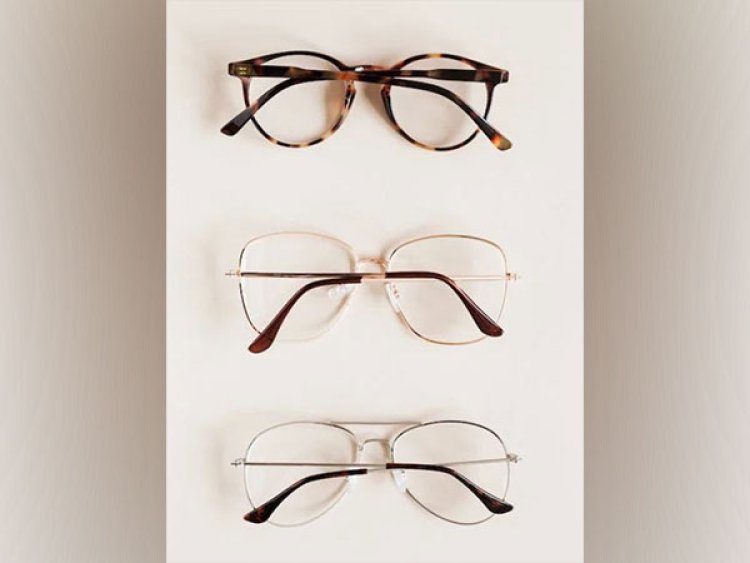Blue-light glasses may not alleviate screen-induced eye strain: Study

Washington, US: According to a review of 17 randomised controlled trials, blue light-blocking eyewear">eyewear has no effect on computer-related eye strain or sleep quality.
The included studies did not examine this outcome, hence the study found no evidence that blue-light-filtering lenses protect the retina, the light-sensitive tissue at the back of the eye.
Since the early 2000s, optometrists have increasingly prescribed or suggested blue-light filtering lenses, often known as blue-light-blocking eyeglasses.
Researchers from the University of Melbourne conducted the latest review, which was published in the Cochrane Database of Systematic Reviews with collaborators from City, the University of London, and Monash University.
The team's purpose was to compare the benefits of blue-light-blocking lenses to non-blue-light-blocking spectacles in terms of improving visual performance, protecting the retina, and improving sleep quality.
After analyzing data from every randomized controlled trial they could uncover, they discovered 17 experiments from six different nations. Participant counts in various experiments ranged from five to 156, and the length of time used to evaluate the lenses was somewhere between a few hours to five weeks.
The senior author of the review is Associate Professor Laura Downie, Dame Kate Campbell Fellow and Head of the Downie Laboratory: Anterior Eye, Clinical Trials and Research Translation Unit, at the University of Melbourne, Victoria, Australia.
She said, “We found there may be no short-term advantages with using blue-light filtering spectacle lenses to reduce visual fatigue associated with computer use, compared to non-blue-light filtering lenses. It is also currently unclear whether these lenses affect vision quality or sleep-related outcomes, and no conclusions could be drawn about any potential effects on retinal health in the longer term. People should be aware of these findings when deciding whether to purchase these spectacles.”
However, the quality and duration of the studies also need to be considered, she said.
“We performed the systematic review to Cochrane methodological standards to ensure the findings are robust. However, our certainty in the reported findings should be interpreted in the context of the quality of the available evidence. The short follow-up period also affected our ability to consider potential longer-term outcomes.”
The first author of the review, Dr Sumeer Singh, a postdoctoral research fellow in the Downie Laboratory, said, “High-quality, large clinical research studies with longer follow-up in more diverse populations are still required to ascertain more clearly the potential effects of blue-light filtering spectacle lenses on visual performance, sleep and eye health. They should examine whether efficacy and safety outcomes vary between different groups of people and using different types of lenses.”
The review did not find any consistent reports of adverse side effects from using blue-light filtering lenses. Any effects tended to be mild, infrequent and temporary. They included discomfort wearing the spectacles, headaches and lower mood.
These were likely to be related to the wearing of spectacles generally, as similar effects were reported with non-blue-light filtering lenses.
Prof Downie said, “Over the past few years, there has been substantial debate about whether blue-light filtering spectacle lenses have merit in ophthalmic practice. Research has shown that these lenses are frequently prescribed to patients in many parts of the world, and a range of marketing claims exist about their potential benefits, including that they may reduce eye strain associated with digital device use, improve sleep quality and protect the retina from light-induced damage. The outcomes of our review, based on the current, best available evidence, show that the evidence is inconclusive and uncertain for these claims. Our findings do not support the prescription of blue-light filtering lenses to the general population. These results are relevant to a broad range of stakeholders, including eye care professionals, patients, researchers and the broader community.”
The potential mechanisms by which blue-light filtering lenses might be able to help with eye strain, sleep and protecting the retina are unclear. One basis for claims about the benefits of these lenses is that modern digital devices such as computers and smartphones emit more blue light than traditional lighting sources, and are being used for longer, and closer to bedtime.
Dr Singh said, “The amount of blue light our eyes receive from artificial sources, such as computer screens, is about a thousandth of what we get from natural daylight. It’s also worth bearing in mind that blue-light filtering lenses typically filter out about 10-25 per cent of blue light, depending on the specific product. Filtering out higher levels of blue light would require the lenses to have an obvious amber tint, which would have a substantial effect on colour perception.”















































